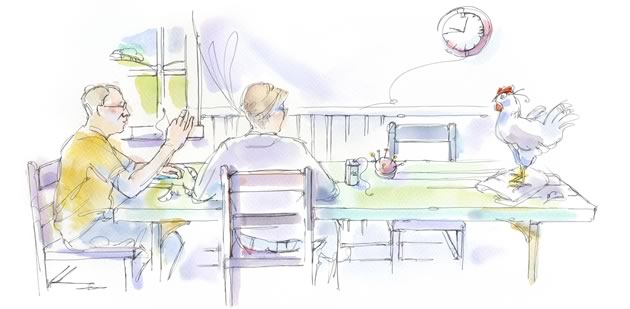A Country Practice
Apart from the little tufts of dental floss sticking out of her head, she looked pretty good.
When you decide to keep animals for food production, there are a number of elective medical procedures you are expected to perform without professional assistance. Tail docking, de-worming, vaccinations, emetics, soporifics, foot treatments, colon irrigations and holistic Shiatsu massage are part of the small farmer’s stock in trade. We are all genial quacks with well-stocked dispensaries and shelves sagging from the weight of books with titles like Common Sheep Diseases: Treatment and Cures. Sheep and chickens have an alarming instinct for self-destruction, especially in the middle of a holiday weekend. The shepherd and poultry man must be on call 24/7 to respond to emergency trauma with either a suture or a shovel.
My wife and I had a dream. We were going to live a quiet life in the country surrounded by softly clucking hens and gentle sheep, all of us working in harmony with Nature. But it turns out the natural world is a very violent place. Coyotes roam the fields at night, hawks patrol the skies by day. Livestock must be held in protective custody behind razor wire and high-voltage fences for their own protection. Even so, violence often breaks out within the prison population itself.
I had a trio of hens that did not play well with others. They hived themselves off from the rest of the flock and took up residence on the sheep pen door. Chickens are cliquey and prickly creatures that are quick to take offence. “Pecking order” is a phrase we use today to describe the unpleasant quality of life in an insurance company or a church group, but it originated from the study of life in the henhouse. Professor Schjelderup-Ebbe, the Norwegian zoologist who coined the phrase, said “defence and aggression in the hen is accomplished with the beak.”
Anyway, the breakaway sect of chickens soon differed among themselves on some question of doctrine and came to blows. Before long, the little grey hen had a bloody patch on the top of her head. So I decided to give them away to a friend who had just purchased one of those elegant mail-order henhouses on wheels and needed a starter flock. I thought maybe a change of scenery would snap them all out of their funk.
At dark I snuck into the sheep barn, snagged the three hens and popped them into a cage overnight. The next morning when I delivered the birds, my friend knelt down to look in the cage and recoiled in horror. “What on earth happened to that chicken?” she cried. I looked more closely and realized the little grey hen hadn’t just been pecked … she had been scalped … by her two closest friends.
What to do? I took the hen home and went to the garden shed for a shovel.
“No, no!” my wife protested. “She’s my favourite hen. We can fix her.”

So while she held the hen on the kitchen table I cleaned it up with antiseptic solution, pulled the flap of skin back up to the crown and put five neat little sutures in her forehead using dental floss. Illustration by Shelagh Armstrong.
My wife is descended from a long line of practical farm people who glance at a suffering chicken, smack it on the head and get on with their day. But that gene somehow skipped her generation. So while she held the hen on the kitchen table I cleaned it up with antiseptic solution, pulled the flap of skin back up to the crown and put five neat little sutures in her forehead using dental floss. Then we set her down and she walked back to the barn.
That night she settled back on her usual perch alone on the sheep pen. Apart from the little tufts of dental floss sticking out of her head, she looked pretty good. I gave her a couple of aspirins and told her to call me in the morning if there was any change.
The next day she came to the veranda for breakfast as usual. When she turned her head, I saw that I had put a little too much tension on one side and her left eyebrow was now pulled up in a pronounced arch that made her look like Gloria Swanson.
Gloria is now eight years old and still lives with the sheep, although this is a poor practice because sheep will pick up a virus from bird droppings if they can’t find any other way to do themselves in. But there’s something about Gloria that appeals to me. She is a Dissenter, a Party of One, the last member of the True Church. The expression on her face is wary, alert and extremely sceptical about everything, including the medical profession.







Haha, reminds me of my adventures on the farm and especially of one duck!
Anne-Marie Roussy from Shelburne, On on Sep 24, 2013 at 3:19 pm |